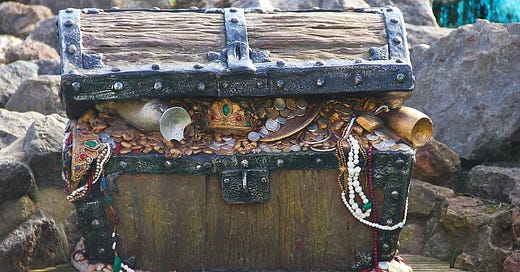My son recently spent a month in Greece with two of his friends after graduation, and he sent me a meme on Instagram, as teens today do. It included this quote: “If more of us valued food and cheer and song above hoarded gold, it would be a merrier world.” ~J.R.R. Tolkien, The Hobbit.
I replied to him, right there in Instagram messages, by saying this: “Amen. Basic goods all day! I know I can be a Natural Law Karen, but it had to be said. And Tolkien, I think, would approve.”
True story. I’m a nerd, and we both know it. But food, cheer and song clearly do fall among the basic goods, and it did have to be said. And he kindly tolerates me.
My son leaves for college in a month, and he and I talk about life and meaning pretty often; lately we’ve been talking about the basic goods. There aren’t many basic goods, but Tolkien clearly recognizes them and knows that their intrinsic value.
Natural law teaches us that the basic goods are: life, friendship, beauty, knowledge, play, and practical reasonableness.
These are literally the Good Things. They’re what make life worth living. They’re always reasons for acting. And pursuing them brings about good traits in your character.
In Tolkien’s quote, it’s easy enough to see that “food” is shorthand for life – sustenance (physical and emotional). His “cheer,” in context, is friendship. And his “song” is beauty. It’s a picture of flourishing – comrades sitting together around a campfire, enjoying those things that bring a soul alive… and being, of course, the better for it.
“Hoarded gold,” by contrast, doesn’t bring about flourishing. In fact, any kind of gold can’t cause flourishing. That’s because money and treasure aren’t basic goods; they’re only – at best – instrumental goods. You see money can be used to access a good – it can be used to buy medicine to protect life or books that yield knowledge. But it can also be used to buy drugs that diminish health or a gun to murder someone. So the money is not and never can be good in itself… even though it can be used to get a good.
It takes wisdom and often restraint to use money in ways that advance basic goods in our lives.
This is true not just of money but of other instrumental goods too. The internet’s another good example – like money, it isn’t good or bad in itself. You can use the web to acquire knowledge or connect with a friend; these uses are reasonable (pointed at the good). Or you can use it to watch porn or stalk a co-worker; these uses are unreasonable (pointed at the bad).
Most of us spend a lot of time thinking about and interacting with instrumental goods like money and the internet. This is expected and normal in modern life. Money’s necessary to buy the things we need to live, and we likewise need the internet to do… just about everything, today.
But how we pursue and use instrumental goods is very, very important. Having them makes us feel powerful and often important, even if we aren’t using them in reasonable ways. It’s easy to overdo them. It’s easy to start deriving pleasure from them, for their own sake. And this is damaging to our souls and ultimately brings us unhappiness.
I thought about Tolkien, his words, and my exchange with my son during a recent, blissful reunion of old friends. Most of us hadn’t seen each other in years, and it was so sweet to be together. It was a glorious Maine weekend in July, and we dined and swam and listened to each other’s stories and laughed and hiked and gave advice and lay in the sun. One friend said that it felt like a taste of heaven. And I, natural law Karen that I am, toasted us explicitly in the name of the basic goods. “We’ve had life, beauty, knowledge, friendship, and play this weekend,” I said. “We are living the basic goods… and flourishing!” What a gift.
This, and what Tolkien is getting at, are what natural law is all about. Natural law tells us that we can use our reason to know what is objectively good, we can pursue what’s good, and we can thrive as a result of taking those actions.
At the end of life, no one wants to be lying alone next to a pile of hoarded gold. It’s not what the human soul actually craves. We want the true, beautiful, and transcendent things – and we want our lives to be marked by them.
So here’s to seeking - with Bilbo and Tolkien - the good.





Love this. Clear. And inspiring. Thanks xx